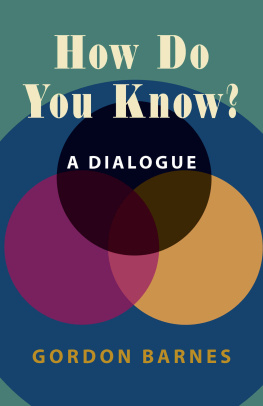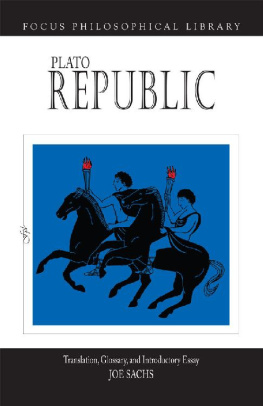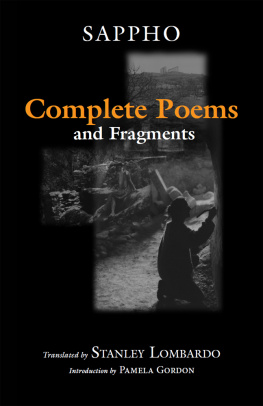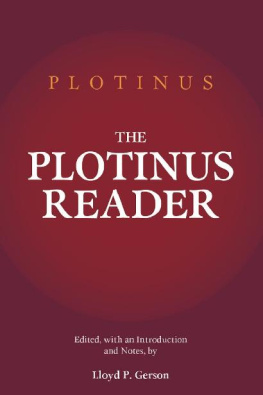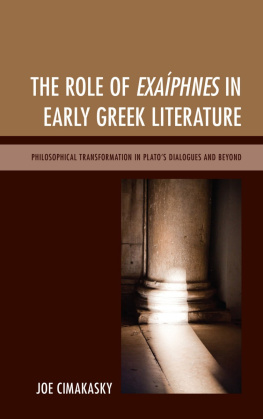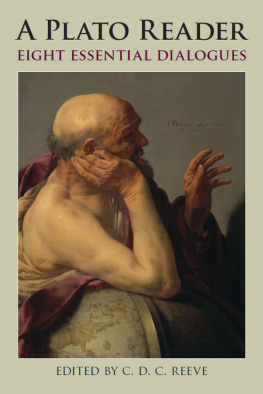Gordon Barnes - How Do You Know? (Hackett Philosophical Dialogues)
Here you can read online Gordon Barnes - How Do You Know? (Hackett Philosophical Dialogues) full text of the book (entire story) in english for free. Download pdf and epub, get meaning, cover and reviews about this ebook. year: 2021, publisher: Hackett Publishing Company, Inc., genre: Religion. Description of the work, (preface) as well as reviews are available. Best literature library LitArk.com created for fans of good reading and offers a wide selection of genres:
Romance novel
Science fiction
Adventure
Detective
Science
History
Home and family
Prose
Art
Politics
Computer
Non-fiction
Religion
Business
Children
Humor
Choose a favorite category and find really read worthwhile books. Enjoy immersion in the world of imagination, feel the emotions of the characters or learn something new for yourself, make an fascinating discovery.
- Book:How Do You Know? (Hackett Philosophical Dialogues)
- Author:
- Publisher:Hackett Publishing Company, Inc.
- Genre:
- Year:2021
- Rating:5 / 5
- Favourites:Add to favourites
- Your mark:
- 100
- 1
- 2
- 3
- 4
- 5
How Do You Know? (Hackett Philosophical Dialogues): summary, description and annotation
We offer to read an annotation, description, summary or preface (depends on what the author of the book "How Do You Know? (Hackett Philosophical Dialogues)" wrote himself). If you haven't found the necessary information about the book — write in the comments, we will try to find it.
How Do You Know? (Hackett Philosophical Dialogues) — read online for free the complete book (whole text) full work
Below is the text of the book, divided by pages. System saving the place of the last page read, allows you to conveniently read the book "How Do You Know? (Hackett Philosophical Dialogues)" online for free, without having to search again every time where you left off. Put a bookmark, and you can go to the page where you finished reading at any time.
Font size:
Interval:
Bookmark:
How Do You Know?
A D IALOGUE
How Do You Know?
A D IALOGUE
Gordon Barnes
Hackett Publishing Company, Inc.
Indianapolis/Cambridge
Copyright 2021 by Hackett Publishing Company, Inc.
All rights reserved
Printed in the United States of America
24 23 22 21 1 2 3 4 5 6 7
For further information, please address
Hackett Publishing Company, Inc.
P.O. Box 44937
Indianapolis, Indiana 46244-0937
www.hackettpublishing.com
Cover and interior design by E. L. Wilson
Composition by Aptara, Inc.
Cataloging-in-Publication data can be accessed via the Library of Congress Online Catalog.
Library of Congress Control Number: 2021932233
ISBN-13: 978-1-62466-991-0 (pbk.)
ISBN-13: 978-1-62466-993-4 (PDF ebook)
Epub3 ISBN: 978-1-64792-018-0
Kindle ISBN: 978-1-64792-019-7
David Morrow and Anthony Weston, A Workbook for Arguments: A Complete Course in Critical Thinking , Third Edition.
Anthony Weston and Stephen Bloch-Schulman, Thinking Through Questions: A Concise Invitation to Critical, Expansive, and Philosophical Inquiry .
Ren Descartes, Meditations on First Philosophy . Translated by Donald A. Cress.
Certainty . Edited, with Introduction, by Jonathan Westphal.
Plato, Meno . Translation, Introduction, and Glossary by Eva Brann, Peter Kalkavage, and Eric Salem.
Contents
The page numbers in curly braces {} correspond to the print edition of this title.
For Marnie
At its best, philosophy is a good conversation. I grew up in a family that loved good conversation, and no one has taught me more than the people I grew up with: Ellen Dodrill, Brenda Thompson, Martha Jones, Robert Barnes, and Laura Harris. Thanks to his great generosity, my brother Bob and I have had great conversations in places like London, Paris, Barcelona, and Madrid. In recent years, I have enjoyed great conversations with my brother-from-another-mother Joe Thompson. In philosophy, I have had three great conversation partners: Matt Davidson, John Kronen, and Joseph Long. I have learned more from them than I could ever recount. Since moving to Rochester, New York, I have enjoyed good conversations with Peter Karpien and Greg Garvey. My wife and I have enjoyed countless conversations around the dinner table with the Liebert family: David and Nancy; Peter and Amy; Tim and Natalie; Heidi, Dave, Abby, and Sarah. One of the best conversationalists I have ever met is Chuck Vanduzee. I could talk to Chuck from dawn to dusk and I sometimes have. Over the last sixteen years, I have had the pleasure of teaching philosophy at SUNY Brockport, and my time there has been filled with great conversations with students. There are too many of them to name here, but I am grateful to every one of them. In a telephone conversation with my editor Jeff Dean, he impressed on me that we live in an age in which knowledge is contested. Throughout this process, Jeff has given me great advice and support. I would never have gotten this done without the constant help and support of our respite workers, and dear friendsTess Cooper, Ashley Samuels, and Bridget Behan. Finally, and most importantly, I am deeply grateful to my wife, Marnie Barnes. Over the last year, when our lives were more difficult than usual, she moved mountains to help me get this done. She read and commented on the entire manuscript and saved me from many mistakes. She is also my favorite conversation partner in the world.
This book is about problems of knowledge that arise in everyday life. If you are not an expert, then how can you know that another person is an expert? What if the experts are politically biased? Should you still trust them? More generally, what attitude should you take to the testimony of other people? Should you treat all testimony as innocent until proven guilty, or is that just gullible? Does the internet make us better knowers, or is it really just a minefield of misinformation? Is it always irrational to believe a conspiracy theory? Suppose you find out that someone who is just as intelligent and well informed as you disagrees with you about something. How should that affect your belief? Should you change your mind or be less confident that you are right? Is it possible to know what is morally right and morally wrong? Is morality something that can be known? These are the questions that are discussed in this book. These issues are fundamentally social. Testimony, trust, and disagreement are in all relations between two or more people. Therefore I have chosen to write in the form of a dialogue. This is a dialogue between three college studentsPaul, Steve, and Maya. Paul and Steve grew up together in a small town, and then they went off to college together. Over the course of their first year in college, Steve changed his mind about many things, but Paul did not. This was largely due to the fact that Steve trusted his professors, whereas Paul did not. Steve sees his professors as experts who tell the truth about the world, whereas Paul sees his professors as biased activists who want to indoctrinate him. So the friendship between Paul and Steve has started to fall apart. The third student in the dialogue, Maya, is a senior who offers to mediate a conversation between Paul and Steve to see if they can work out their differences. Their conversation takes them through all of the topics listed above. This is not a rhetorical exercise. These are difficult questions, and there are no easy answers. In Chapter One, they discuss whether it is possible for a non-expert to know if someone else is really an expert. This leads them to the question of when you should trust the testimony of another person. In Chapter Two, they discuss the reality and relevance of biasboth to trust in others and to trust in oneself. In Chapter Three, they discuss the internet and how it has affected us as knowers. This leads them to a discussion of conspiracy theories. In Chapter Four, they discuss the issue of disagreement between equally intelligent, well-informed people. Finally, in Chapter Five, they discuss the problem of moral knowledge. A paradox that reappears throughout the dialogue is that social trust is epistemologically problematic, yet it appears to be indispensable for the pursuit of knowledge by creatures like us.
{1}
Maya sits alone in her dorm room, trying to study. Across the hall, Paul and Steve are arguing loudly.
Paul: | My mother told me herself, Steve! Dont call my mother a liar! |
Steve: | Im not calling anyone a liar, Paul. Im just saying that I know your mother is wrong. |
Paul: | You dont know that! |
Steve: | Yes, I do! |
Paul: | No, you dont! Youre being a jerk! |
Unable to study, Maya gets up from her desk and walks across the hall.
Maya: | Guys, youre getting pretty loud. Can you dial it down? |
Paul: | Sorry, Maya. |
Maya: | Whats going on? What are you fighting about? |
Paul: | My brother is autistic. |
Maya: | Yes, I know. I have a cousin whos autistic. We talked about it last fall. |
Paul: | Oh yeah, I guess I forgot about that. Well, Im not surprised. The percentage of people with autism has been increasing steadily for years now. And you have to wonder why that is. |
Steve: | Thats what were fighting about. |
Maya: | Ohhh. Is this about vaccines? |
Steve: | You guessed it! |
Paul: | Look, before you call me an idiot... |
Font size:
Interval:
Bookmark:
Similar books «How Do You Know? (Hackett Philosophical Dialogues)»
Look at similar books to How Do You Know? (Hackett Philosophical Dialogues). We have selected literature similar in name and meaning in the hope of providing readers with more options to find new, interesting, not yet read works.
Discussion, reviews of the book How Do You Know? (Hackett Philosophical Dialogues) and just readers' own opinions. Leave your comments, write what you think about the work, its meaning or the main characters. Specify what exactly you liked and what you didn't like, and why you think so.

